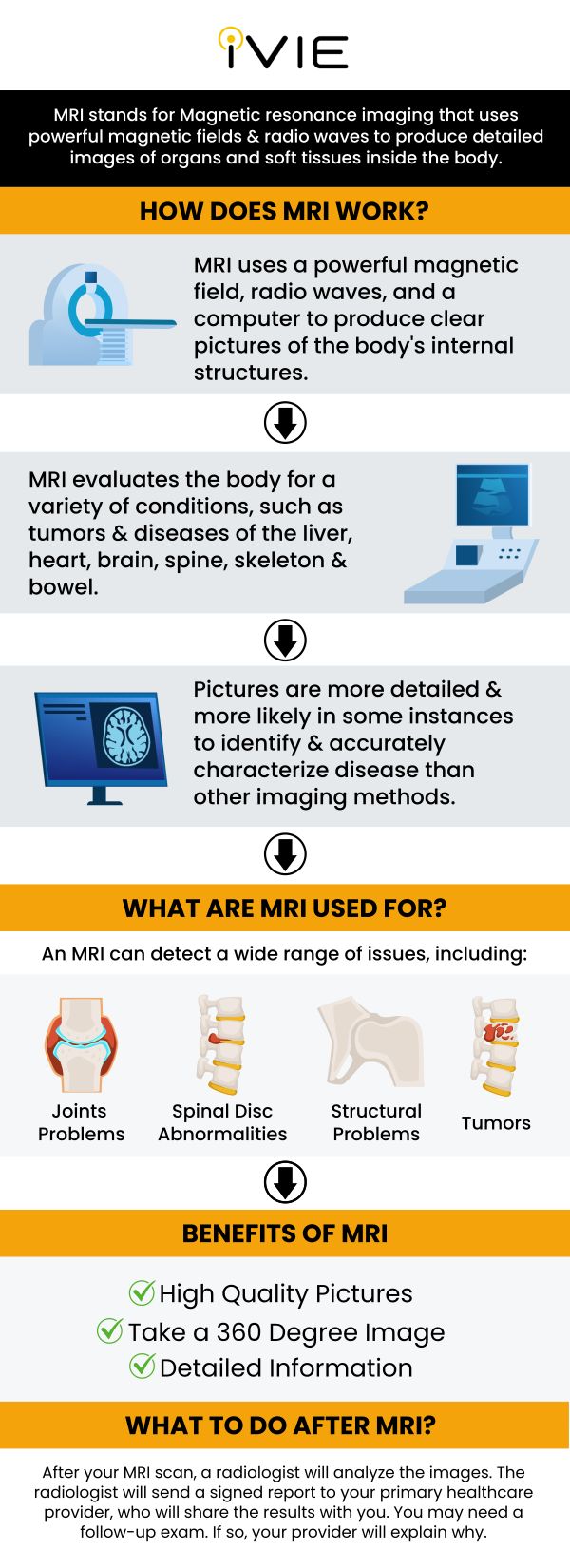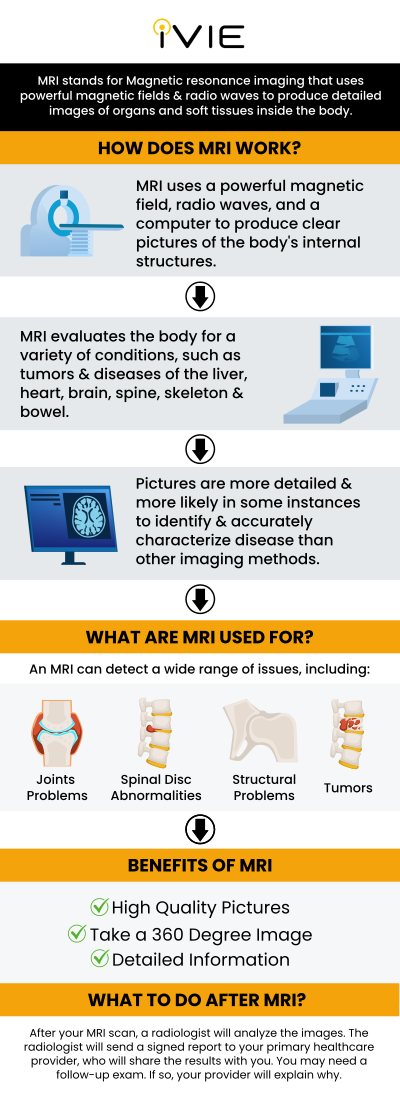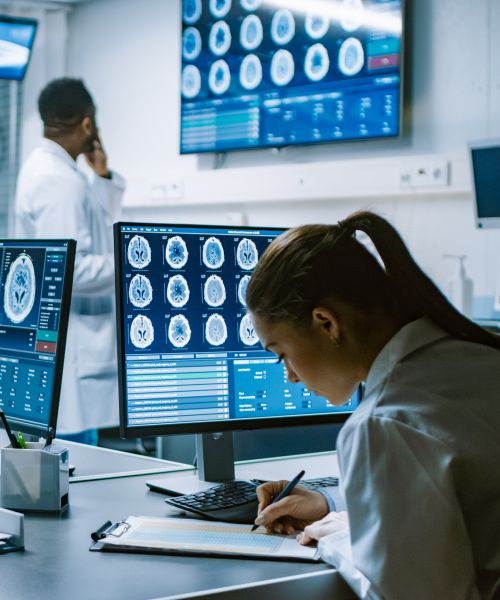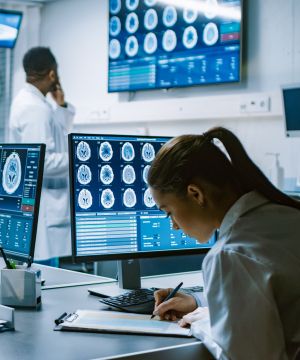Conditions that May Require an MRI
An MRI can detect the effects of a stroke, Alzheimer’s disease, or brain injury. If your doctor believes your problem is related to your soft tissue or internal organs, they may arrange an MRI. MRIs provide detailed images of your soft tissues, nerves, and blood arteries. Meet Dr. Kourosh Naini and learn more about the MRI at iVIE. For more information, contact us or book an appointment online. We are located at 11600 Washington Pl Suite 104A, Culver City, CA 90066.


Table of Contents:
What are some reasons to have an MRI?
How do you determine if you need an MRI?
What symptoms would warrant an MRI?
Healthcare professionals use magnetic resonance imaging (MRI) scans to investigate and diagnose various conditions. Some of the conditions that can be identified with the help of an MRI include:
• Tumors – MRI scans are highly effective for locating tumors in the body, determining their size, and guiding treatment planning.
• Joint injury or disease – For conditions affecting joints, such as various types of arthritis or injuries like ligament or tendon tears, MRIs can provide detailed images of bones, joint cartilage, and soft tissues to support the diagnostic process.
• Spinal cord injury or disease – MRI scans are used to assess conditions such as herniated discs and spinal stenosis. This diagnostic tool allows doctors to assess what treatment approach is ideal, whether it be surgical intervention or physical therapy.
• Heart conditions – MRI of the heart and blood vessels can assess the size and function of the heart chambers, the thickness and movement of the walls of the heart, and the extent of damage caused by a cardiovascular event or heart disease.
• Kidney conditions – This scan can be used to examine the kidneys for tumors, cysts, blockages, or infections. MRIs provide valuable information on kidney function and structure without the need for radiation.
• Liver conditions – MRIs are useful for detecting liver diseases, including cirrhosis, liver tumors, and abnormal liver function. The results of the scan can sometimes provide doctors with enough information to differentiate between benign and malignant liver lesions.
• Stroke – In the case of a stroke, MRIs can be used to quickly identify the type and the location of the stroke to guide treatment decisions.
• Multiple sclerosis (MS) – This diagnostic tool is considered the most reliable imaging technique for diagnosing multiple sclerosis and monitoring its progression.
• Bone infections – MRI scans can detect acute osteomyelitis and other types of bone infections that are often not as easily detected on an X-ray.
To determine if you need an MRI, you should speak to your healthcare provider about your concerns. The doctor will listen to your symptoms and concerns and decide whether an MRI scan is needed to diagnose the root of the problem. This tool is highly effective for diagnosing neurological conditions, such as stroke, brain tumors, and multiple sclerosis (MS).
In addition, MRI scans are often used to assess the spine, abdomen, soft tissues, and internal organs for abnormalities. If an MRI is deemed necessary, your doctor will guide you through the next steps. This typically involves a referral to a specialized facility where the MRI will be performed. Once you schedule your MRI scan appointment, you will be provided with information on how to prepare.
If you are experiencing certain signs or symptoms, your doctor may order an MRI to assist the diagnostic process. Some of the symptoms that often warrant an MRI include:
• Chronic pain – Persistent pain that does not go away despite home care and other treatments should be examined in detail with the help of an MRI scan. Through MRI technology, abnormalities in the soft tissues, nerves, and bones can be detected.
• Joint problems – If you are experiencing swelling, pain, or dysfunction of one or more joints, an MRI scan can be used to obtain a clear image of the soft tissues around the affected joints, including cartilage, tendons, and ligaments.
• Neurological symptoms – Symptoms such as severe headaches, dizziness, hearing or vision problems, or changes in behavior can be signs of neurological problems. MRI scans are highly effective for examining the brain and spinal cord and can be used to diagnose brain tumors, MS, and other neurological conditions.
If you are experiencing these symptoms or other unexplained changes or concerns, you should see your healthcare provider to discuss the next steps. Your doctor will determine whether an MRI is the most effective approach to understanding what’s causing your symptoms. For more information, contact us or book an appointment online. We are located at 11600 Washington Pl Suite 104A, Culver City, CA 90066. We serve patients from Los Angeles CA, Beverly Hills CA, Santa Monica CA, Irvine CA, and surrounding areas.


Additional Services You May Need
▸ Dementia Screening
▸ Aneurysm Screening
▸ Spine MRI
▸ Whole Body MRI Screening
▸ MRI Brain Screening
▸ Brain PET
▸ Work/Sport Spine Injury Diagnosis
▸ Work/Sport Brain Injury Diagnosis
▸ Whole Body PET For Cancer
▸ MRA Brain Screening


